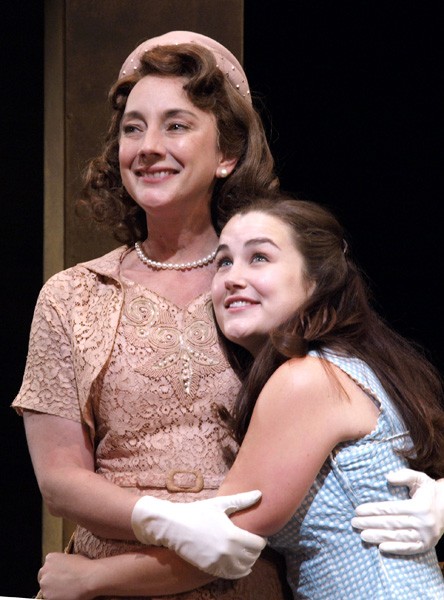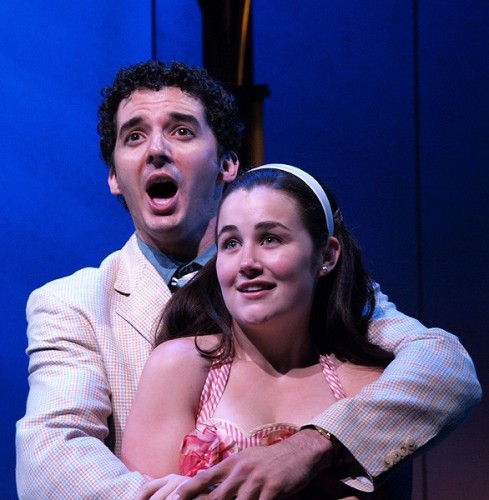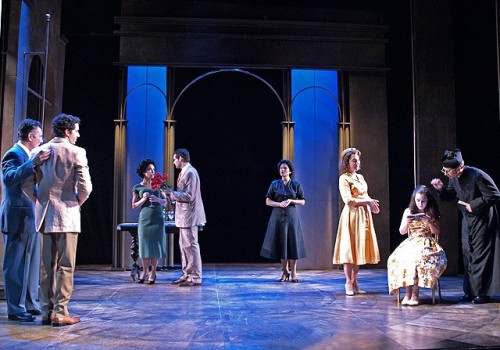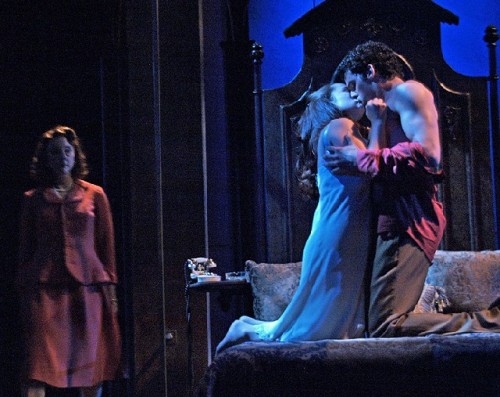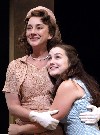The Light in the Piazza Shines at Vermont's Weston Playhouse
Italy. Love at first sight. Disapproving parents. Sound familiar?
By: Larry Murray - Jul 14, 2008
The Light in the Piazza. Book by Craig Lucas, Music and Lyrics by adam Guettel. Directed by Steve Stettler. Margaret Johnson/Theresa McCarthy, Clara Johnson/Lauren Worsham, Fabrizio Naccarelli/Kevin Worley, Signor Nacarelli/David Bonanno, Giuseppe Naccarelli/Jonathan Raviv, Franca Naccarelli, Sarah Uriarte Berry, Signora Naccarelli/Michelle Rios, Roy Johnson/Micheal Berry.
Music Direction, Andy Einhorn, Musical Staging, Jennifer Turey, Scenic Design, Russell Metheny, Costume Design, Mara Blumenfeld, Lighting Design, Kendall Smith, Sound Design, Nathaniel Hare, Production Stage Manager, Chad Zodrow, Dialect Coach, Patricia Norcia. Running time: about 2 hours, 15 minutes. Through July 26, 2008.
Clara and Fabrizio are a modern day Romeo and Juliet, and while the Johnson's and the Naccarelli's are not the Capulets and Montagues, you just know the odds are stacked against a happy ending. But beyond these similarities, The Light in the Piazza is a somewhat different kind of story, one that is more musical than verbal. For one thing, the book by Craig Lucas takes a secondary role to the magnificent music and lyrics by Adam Guettel.
The story line is based on the short novel by the same name, written by Elizabeth Spencer. The heart of the story is the inward conflict of the mother, her mildly retarded daughter, and young Clara's courtship with the handsome Italian Fabrizio. Many of the emotions are communicated through the music and lyrics, rather than the acting. Lucas is a brilliant playwright in his own right, but the music has such heartfelt lyrics,that all is left for him to do is to write the continuity, stitching the songs together.
Adam Guettel's score is contemporary yet timeless. Being from a line of Broadway composers, Guettel has both a touch of the old romantic Richard Rogers lyricism and the adventurous spirit of the new freer Sondheim form.
Through a series of fortunate coincidences and interests, Guettel has spent much time over the years with this company, having first introduced some of his work on this project six years ago before it was fully produced. Now, after winning several Tony's it is back and Guettel has helped create a new arrangement for the music, trimming down the big Lincoln Center sized score written for 14 musicians to a chamber ensemble of 5 players.
The cast is likewise reduced to its essential eight key players (all Equity actors in this Weston production) plus assorted supernumeraries. The end result is that this is both the New England premiere of the work, and the world premiere of a newly revised arrangement of the score for a chamber production.
Since the story is told musically, it would seem to solve a problem that often afflicts serious musical theatre. You see, not many wonderful singers are also great actors. And vice versa. So directors almost always have to choose which of the two is more important. In this production, the music wins, and for the most part that was the correct choice to make.
When asked what the benefit of telling a story musically was, Guettel answered that it was: "The physics of sound. Musical sound has physical properties that act on the body, and therefore the heart. The combination of music and words can be an exquisitely physical experience for the listener. So if a story is told that way, a story can sink in pretty deep." (Weston Stage Notes and Seattle Weekly)
The production is well done with simple but clever set pieces enhanced with projections to suggest a church and Tiffany glass. The music is played by the small ensemble set off to the right and front of the stage. The music did sometimes overpower the singing during pianissimo passages in particular, an easy fix.
Playing the mother is Theresa McCarthy whose lovely, clear voice transmits her tender and protective feelings towards Clara, her daughter. Lauren Worsham's singing infuses Clara with girlish charm and whimsy. One moment is particularly memorable. In the second act, when her hopes are dashed, she lets out an operatic cry of anguish unlike anything you have ever heard - half sung and half wailed - a special moment that surely broke every heart in the house.
Fabrizio is the object of Clara's affections, and his role is sung strongly by a wonderful Kevin Worley. His Florentine mother is played by Michelle Rios and her all too brief moment in the spotlight quickly captured the audience's heart as all Italian mothers are inclined to do. In fact, her whole stage family acquitted themselves with great brio and gusto. Bravi.
There were two problems. Despite the bel canto assets of this production, something was missing. Some of the acting was undistinguished. In a state that produced the great stone faced Calvin Coolidge, I suppose actors whose expressions change little during the course of a performance are not viewed as unemotional, but simply normal. The end result was a mother who appeared to be cold and distant towards her daughter. Clara in turn seemed to have only three emotions: happy, disappointed or frightened.
The lack of acting finesse also brought up the question of the conventions that singers use. Why do so many of the gesticulations used during a song always resemble the hands of a clock, with ten minutes before two and twenty past eight being the most popular. This is not to say that efforts were not made to act as well as sing. Just too little. In summer theater there are always sacrifices due to the constraints of time. Perhaps this was one of them.
I won't grade the direction by Steve Settler, preferring to just give it an incomplete. Certainly there was much rolling of set pieces back and forth, and movement on and off stage, but stage direction is much more than that. Consciously or not, audiences look for the dozens of tiny acting details and clues that help them make the characters they are watching into human beings worth relating to.
That said, there are some amazing moments as well. The Act II Octet where the eight main characters each turn their distinctive musical lines into an amazing fugue is one of the highlights of the evening. It has been half a century since Broadway composers wrote with such complexity, Stephen Sondheim notwithstanding.
For this chamber production, Guettel and music director Andy Einhorn worked to return the score to its simpler beginnings. In the original Seattle production there was a string trio (violin, cello, bass) plus piano and harp. They returned to that simpler combination, editing and rearranging the score from the larger Goodman and Lincoln Center productions.
The result is a rich and romantic sound that is rarely heard in musicals in this area, and reminds one of how much is missing when whiney synthesizers and banging pianos are used to substitute for real honest to god musicality. Thank you Adam Geuttel. Kudos to you Weston Playhouse. And bless you all, the boys and girls in the band: Andy Einhorn, Erica Driscoll, Jon Kass, Steve McIntyre and Allison Sidner. You plucked, bowed, vibratoed, colored and fingered the music to perfection.
Overall this fine production adds another significant chapter to the history of theater in Weston. It comes very close to being as good as it gets in these parts. Go see it.
Quick Link to Weston, VT Playhouse

